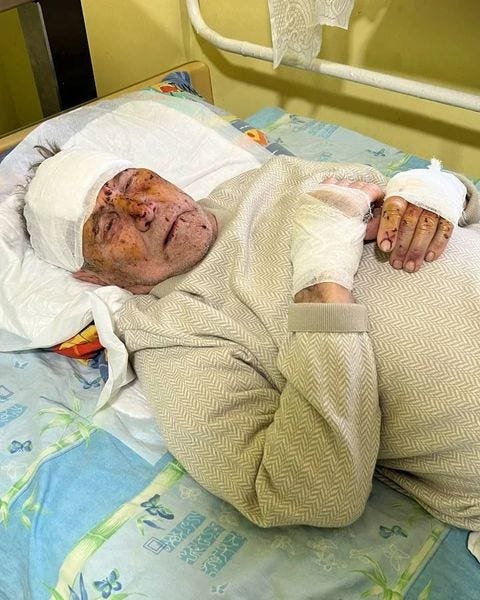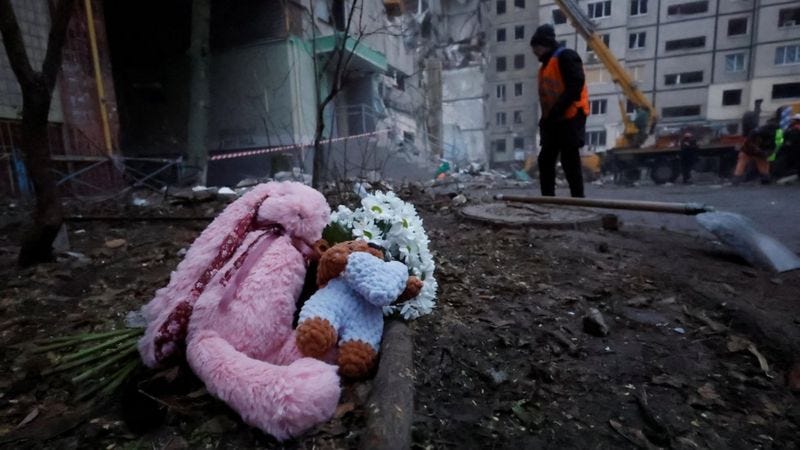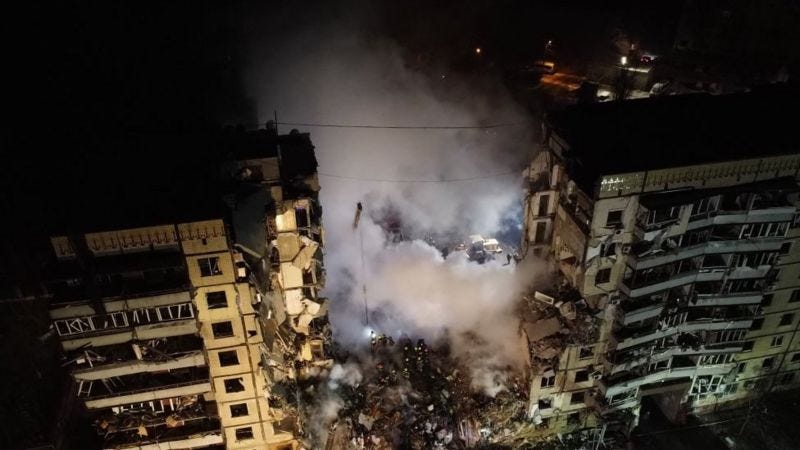Miraculous survival and heartbreaking loss: the people who survived the Dnipro missile strike
The Russian missile strike on the Ukrainian city of Dnipro destroyed lives and left scars that will take a long time to heal.
By Olesya Gerasimenko.
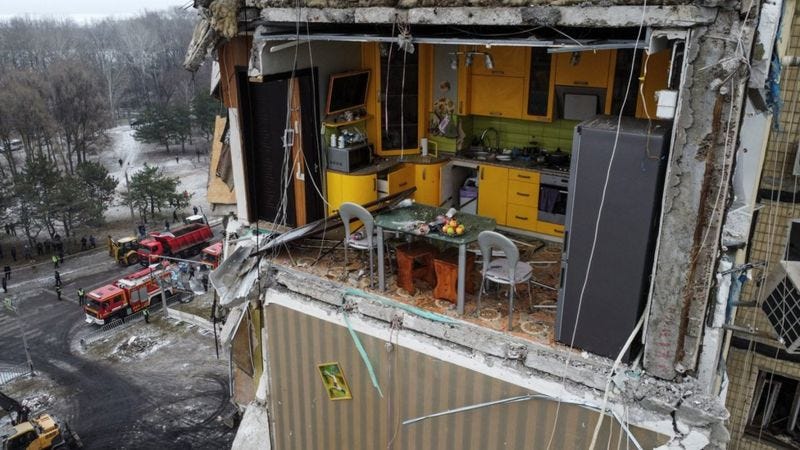
On the afternoon of January 14th in Dnipro, a town in central Ukraine with just under a million people, the air-raid warning signal wailed. By the 325th day of Russia’s war in Ukraine, the locals were used to sirens. That morning, Ukrainian officials had issued a reminder: “The threat of rocket strikes is ongoing. We urge you not to ignore the warnings, stay in the shelters.”
Around lunchtime, the chairman of the Dnipropetrovsk regional council, Nikolai Lukashuk, told journalists that Ukrainian air-defence systems had already shot down several rockets.
“I’m categorically asking that you don’t broadcast any footage of the air-defence systems before the end of the warning period, or – God forbid – approach it,” Lukashuk cautioned local journalists. "Dnipropetrovsk is a frontline region. The invaders are always on the lookout for our air-defence systems, and will strike them whenever they have a chance. Air defence is a lifeline for our people.”
The siren sounded over the town’s ‘Rocket Park’ where there are scale-models of the first Soviet ballistic missiles. These were built in Dnipro’s factories. Closed to foreign visitors until the 1990s, Dnipro was an important city for the military, defence, and space industries of the Soviet Union.
The siren was audible in the city’s Victory (Pobeda) district. This area of Dnipro was built 50 years earlier, on reclaimed marshland. In 1983, the architects behind ‘Victory’ received the State Prize of the Soviet Union, and the district was listed as an architectural monument of national significance.
The region is still considered one of the finest in Dnipro – green, spacious, and only a ten-minute drive from the city centre. It’s close to the river and to a new square with fountains, where there are light shows in the evenings. The buildings in Victory district are nine, twelve, or sixteen stories high. A typical nine-storey tower has sixteen entrances and is home to around 1700 people. The region’s main streets are Heroes’ Avenue, Glory Boulevard, and Victory Embankment. All the names refer to the Soviet victory against Nazi Germany in the Second World War.
The Second World War survivor
January 14th was a Saturday, and many people were at home. One of them was Volodimir Ivanovich, a 90-year old grandfather who survived World War Two as a child. He lived with his daughter, the mother of his three grandchildren, one of whom is at the front. On Saturday, she was busy in town.
The old man was watching television and putting the kettle on to boil. Meanwhile in Russia – according to a statement from Ukrainian forces – a Tu-22 bomber was taking off from an airbase in Kursk. It dropped one of the five Kh-22 cruise missiles with which Russia would strike Ukraine that day. The thousand-kilo missile travelled around 450 kilometres before hitting a nine-storey block of flats in Victory district. Ukrainian forces later confirmed that Ukraine lacks an air-defence system capable of shooting down this kind of target.
At around 16:15, there was a deafening explosion. Mr Galich was knocked unconscious and woke in hospital, with injuries to his head and his hands. His grandsons Maxim and Yevhen took a photo of him and posted it on Instagram.
“This is my grandad, he’s nearly 90, he survived the war and now he’s having to relive it,” Yevhen wrote. “Let people see this and realise that no enemy deserves the pain that ordinary pensioners are suffering now.”
The boxing сoach
The missile destroyed a whole block of flats, from top to bottom, 72 flats where almost 200 people were registered. A photo of one flat went viral – the outside wall has been completely ripped away revealing a kitchen with yellow cabinets and a bowl of apples on the table. This was the home of well-known Ukrainian boxing coach, Mikhail Korenovsky, and his family.
“Mikhail Korenovsky was a great guy,” ran a tribute on the Telegram channel, ‘Dnipro Region.’ “He was a legend, trained many of the best sportsmen, champions…” On Saturday, after his morning competitions, the coach popped up to the flat whilst his family waited outside in the courtyard.
15 minutes later, his two little girls were left without a father, and his wife without a husband. Now they have nobody to go back to – and nowhere to go. Their flat was destroyed.
Standing in silence, filming the smouldering ruins
The Korenovsky sisters were not the only school-age children at home in the block that day. There was also 14-year old Karolina, and 9-year old Maksim. Six months earlier their parents, Irina and Maksim Shevchuk, moved with the children to Dnipro city from the outskirts, fleeing the constant shelling.
They rented a flat in Victory district. On Saturday, the four were going for a walk. The children were already downstairs on the street waiting for their mum and dad to join them. But their parents never made it.
There were many other people standing outside the nine-storey block on Saturday when the missile struck. Mothers were howling, people were shouting curses and children were crying.
One of the Korenovsky family’s neighbours was standing there, a single mother. She’d been out for a walk with her four-month old baby. After the explosion all she was left with were a pram and a puffer jacket.
Roman and his pregnant wife, Lena, were also outside. Half a year earlier, they’d been living in Toretsk. When the town’s bread factory was bombed, Roman’s bakery provided the people with rolls and loaves, they’d worked in three shifts to hand them out.
But when the shelling became fiercer, the family moved to Dnipro. On January 14th, Roman and his wife and children went out to church, leaving his 73-year old mother behind. Returning home, he stood in silence, filming the smouldering ruins on his phone.
Relatives of Irina Solomatina and Olga Usova were standing nearby. The pair were killed in the wreckage – they were dentists, volunteers, and friends to many.
Solomatina and her 13 and six-year old children had lived briefly in Poland back in the spring, but returned to Ukraine. Usova – mother to a three-year old boy – was born in Donetsk. Together they’d worked in a dental ‘volunteer’s unit,’ travelling on a specially-equipped bus to treat soldiers.
On January 14th they were passing the building when the missile struck. Olga’s relative wrote her a posthumous tribute: “Unfortunately, there’s no way for me to take your place – I would if I could, in an instant.”
The mother and brother of 15-year old Maria Lebed were also outside. The mother had been at work when the building collapsed in the rocket strike, with her teenage daughter inside. Maria was in class 9A at school, a member of the dance club and head of the school council. She was buried on the afternoon of January 16th.
And then there were the parents of 17-year old Maksim Bogutsky. He’d celebrated his graduation only last year.
The family from Mariupol
In October 2022, a new family moved in to the nine-storey block in ‘Victory’ district – Rusana Babkina’s mother, grandmother, and younger sister. They were from Mariupol. On the first day of the war, Rusana’s parents and her fiancé joined the defence forces of the city, where they stayed till the last.
Rusana and her grandmother fled occupied Mariupol for Dnipro at the end of March. Her 19-year old sister joined them from besieged Kharkiv. She made the journey standing in a train carriage, fainting from the exhaustion, after being ‘asked to leave’ the hostel where she’d been hiding.
The Babkin parents surrendered to the Russians in May, and Ukrianian forces were ordered to leave the ‘Azovstal’ plant, giving up their weapons – wrote Rusana on Facebook. Her mother was freed as a part of an ‘exchange of women’ four months ago, in October. She travelled to her daughters in Dnipro and had already signed up for the Ukrainian army. The family rented two flats in the same part of the nine-storey block on Victory Embankment.
On January 14th, Rusana’s mother caught a cold, and stayed at home instead of going to her military unit. The younger daughter cleaned the flat, whilst the grandmother fried chebureki [meat turnovers] in the kitchen. Rusana, away on business in Odesa, called home just after 3pm.
“The last time I spoke to mama over the phone was 15:07. Everything’s calm here, she said, relax,” wrote Rusana on Facebook. The phone has not rung since – the three women are missing.
Anastasia Shvets
23-year old Anastasia Shvets also lived in the building. When Russia invaded Ukraine in February, she’d recently finished her master’s degree at Dnipro’s University of Customs and Finance. By September she’d already lost her fiancé. He was killed at the front. “I wasn’t living, just existing all that time, trying to accept that my brave Vlad was no more,” Anastasia wrote on her Instagram account.
On Saturday, she was at home with her parents, Natalya and Maksim Shvets. Her mother was a volunteer at the charity ‘Cats Seeking Homes’; colleagues describe her as a ‘brilliant person’ who saved ‘feline lives and fates’. Saturday was a family day. “I remember dad’s silly jokes, how just today, mum and I were taking pictures of puppies,” wrote Anastasia. “We ate mum’s noodles.”
Then the missile struck. “The bedroom door falls on me, suddenly there’s part of the kitchen in the same room. No bathroom, no kitchen, no corridor, no pantry – then an abyss, and I can see the entrance to someone else’s flat,” said Shvets.

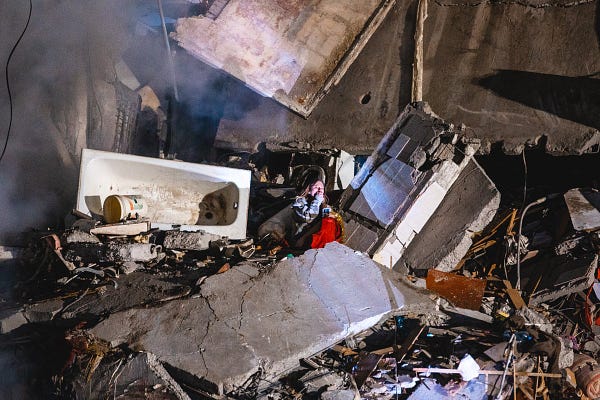

She survived the blast and escaped, in full view of the photographer’s lenses. The world saw her sitting alone up high in the ruins of her apartment, before she was dragged to safety by rescuers. Shvets was clutching a toy dinosaur, and a scrap of tinsel from the Christmas tree.
“Vlad saved me, I’m pretty much intact, except from the wound on my head and my scraped bare legs. I’m sure my parents were in the kitchen, which isn’t there now. I didn’t want to be rescued, I wanted them to find my parents. I know Richard our cat is gone now, he wouldn’t have survived. I want my parents. I’m in pain. Am I really still here?”
Anton and Eva
21-year old Anton proposed to Eva at New Year. They decided to hold the wedding in the spring. On January 14th he drove to Eva’s house, speaking to her over the phone. The young man was 300 metres from the entrance when the rocket hit the block.
The call cut out. Anton rushed nervously to the building. “When I arrived I saw concrete rubble. Everything had collapsed, including the eighth floor where she lived. I climbed up through the ruins, without waiting for the rescuers. The wall was gone, the fridge was still standing there,” he wrote on the Ukrainian website 056.ua.
“Everything was on fire, there was a gas leak. The rescuers were shouting at me to come down, and there I am, moving concrete slabs with my bare hands, looking for her. Then the soldiers grabbed me by the collar, saying the gas could explode,” said Anton. He spent the next five hours helping the rescuers find other survivors.
“We found an injured man by the car, buried under a concrete slab, we lifted it off him and waited for the medics. Closer to the entrance we managed to evacuate a grandma, and after that I only found the dead bodies and remains,” the young man said.
He was losing strength by nightfall. He came out of the rubble, and half an hour later he got the call – Eva was alive. “She was under the rubble by the side of the road, which was a no-go zone as cars had exploded there. There was no way to get through to her, because the archway was blocked by machinery,” explained Anton.
The girl was taken to intensive care. Her fiancé believes Eva lived because she fell from the eighth floor, where the partition wall took the worst of the blast wave, and was shielded from above by concrete slabs from the wreckage.
“She’s in intensive care now, her condition is stable, but serious,” Anton confides, “She’s conscious, but they won’t let anyone see her. They only let me in for two minutes.”
31-year old soldier, Maksim Omelyanenko, searched through the rubble beside Anton. Before the invasion he was working as a coach in Dnipro, then he fought in Kherson, and now – according to Ukrainian news outlet Hromadske – he’s defending the hottest point of the frontline, Bakhmut. A few months before the shelling of Dnipro, he reflected on his service. “If I die young, I promise I’ll be okay – nobody lives forever, and I hope when my time comes I’ll go with a smile. It’s a journey, and I’m grateful for the opportunity to live and learn from pain.”
Hearing of the tragedy in his home town, he rushed back to Dnipro. His mother Ludmilla was under the rubble, with her dog and cat. Ludmilla was rescued from her top-floor flat, she was protected by part of the kitchen, trapped under the blocks.
According to the latest reports, 46 people have died in the missile strike in Dnipro, five of them children. 39 were pulled out from the rubble alive.
Read this story in Russian here.
Translated by Pippa Crawford.




